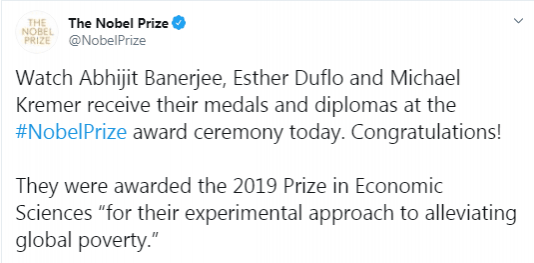Abhijit Banerjee, an Indian-American Economist received the Nobel Prize in Stockholm, Sweden along with French-American Economist and wife Ester Duflo and colleague Michael Kremer. The trio received the Prize in Economics for their study on the experimental approach to alleviating global poverty.

The duo made heads turn at the felicitation ceremony not just for their achievement in Economics but with their attires, too. While Banerjee paid tributes to his roots with his sartorial choices, Ester joined him. Dressed in a black bandhgala paired with off-white dhoti, Banerjee looked dapper as he arrived at the Nobel banquet with Swedish finance minister Magdalena Andersson.
Ester draped an elegant red and green saree as she walked in with Prince Carl Philip of Sweden. Michael, on the other hand, wore a classic suit. The three Noble Prize winners received medals and 9 million Swedish Krona ( Approx 6.5 crore) worth to be shared among the three winners.

Who is Abhijit Banerjee?
Mumbai-born Banerjee received his BSc from the University of Calcutta in 1981, his MA from JNU in 1983 and his Ph.D. from Harvard in 1988. The first person of Indian-Origin to win the Nobel Prize of Economics is Amartya Sen and Banerjee follows in his footsteps by researching poverty-related topics like him. Banerjee is at least the tenth person of Indian origin or citizenship to win a Nobel prize.
While his wife Ester Duflo and Banerjee are both professors in the department of economics Massachusetts Institute of Technology (MIT). Kremer is also a professor in the department of economics at Harvard University.
What is their Economics study all about?
The trio's research has, over the last two decades, helped obtain reliable answers about the best ways to fight global poverty. Their work has revolved around identifying "low-hanging fruits", which are often the most effective interventions in improving outcomes in health and education for the poor.
Their work — breaking down the problem of global poverty into a number of smaller and more precise questions at individual and group level — has redefined research in development economics over the last 20 years. "This new research is now delivering a steady flow of concrete results," stated the popular science background paper made available by the Academy.








